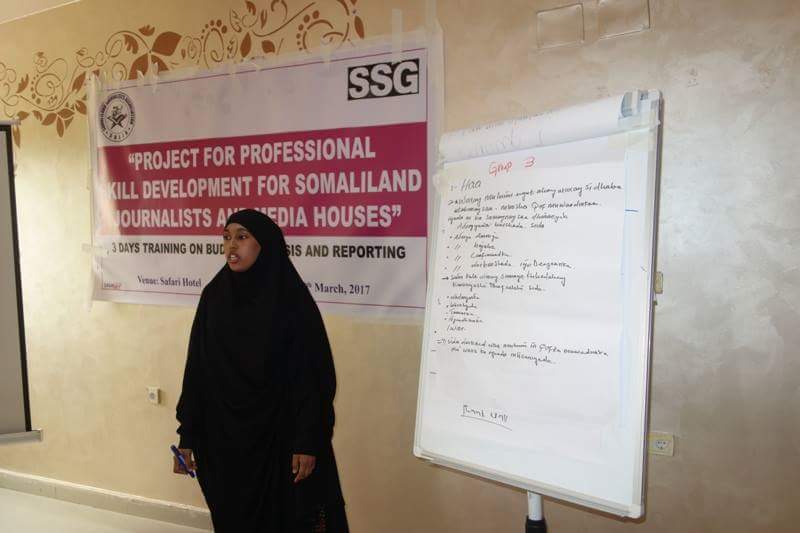In mid-March, at a press conference at Hargeisa’s shiny new airport, a cocky young journalist gathered up his courage and asked Somaliland’s President Ahmed Mohamed Silanyo a difficult question. Is it true, he asked, that the president was a dictator? Silanyo responded perfectly: ‘If this were a dictatorship, you wouldn’t have asked those questions.’
The self-declared (although internationally unrecognised) Republic of Somaliland, otherwise a veritable beacon of democracy and good governance in the Horn of Africa, is often criticised for its attitude to the media. Illegal arrests and detentions of journalists and editors are common, and some media houses have been shut down by the government. It’s not a good look for the territory that is trying so desperately to press its case for international recognition.
But maybe things aren’t as bad as they seem. Truth is, it’s complicated – more complicated than a simple human rights narrative can capture. At first glimpse, the press in Somaliland is varied and vibrant. Newspaper sellers stroll from coffee shop to coffee shop in the capital Hargeisa carrying bundles of tabloid-size titles, in both English and Somali. There are several private television broadcasters, and too many online publishers to count. The standard newspaper mix is a few pages of unique local content with international and sport news culled from the wires (without attribution or royalties).
These papers don’t pull their punches. Take this front-page column from the 23 March edition of The Horn, coincidentally on the subject of press freedom. It is typical. ‘It defies credulity that [President] Ahmed Silanyo would charge journalists with treason when he was engaged in exactly the same behaviour when he was in opposition ... the use of these words is a marker for a descent into fascism,’ writes Adan Iman, who goes on to attack the president personally: ‘His age, which is not less than 80 years, and his bullying and autocratic streak, will be a factor in the election.’
These are not, on the face of it, the words of a media that has been cowed into submission. But how can we reconcile this frank and borderline libellous criticism with the government’s hardline stance? Just a few weeks ago, in early March, Abdirahman Mohamed Ige of Royal TV and Mubarak Osman Saed of Star TV were arrested in the coastal town of Berbera. Their crime? ‘Betraying the Somaliland nation’ – whatever that means. In the last two years, nearly 20 journalists have been arrested or detained, all on similarly spurious charges (although arrests rarely last long).
Some say the journalists had it coming. No one, not even representatives of the Somaliland Journalists Association, would deny that Somaliland’s press corps is not always the most ethical. Or even the most factual. Gossip sells, as does slander, and there’s plenty of that going round (the most recent, and most scandalous example being the entirely unsubstantiated story that the First Lady is having an affair with the former finance minister). ‘Somaliland’s media is deeply unprofessional,’ says one Western diplomat, speaking off the record, and on the whole it’s hard to disagree.
Journalism is not a lucrative profession anywhere in the world, and this is especially true in Somaliland. Many journalists don’t even have a high school qualification, and have turned to journalism as a livelihood rather than a vocation. In some instances, politicians and businessmen can pay for favourable stories, and cash often exchanges hands at press conferences – whether for this purpose, or to cover logistics and enable poorly remunerated journalists to attend.
None of this is any excuse for the government hard-line approach, however. ‘There are a lot of problems with the media itself. There is a lack of ethics and education. But these issues cannot justify [the] reaction of the government. This is the criminalisation of media issues,’ says Guleid Ahmed Jama, a lawyer with Somaliland’s Human Rights Centre.
I ask Barkhad Kaariye, a local correspondent for Voice of America and founder of Somali Investigative Reports, what he thinks of the media freedom situation. He is one of the country’s most respected reporters. His answer is unexpected.
For Kaariye, it’s all about perspective – and his comparison is not to the media freedoms enjoyed by the West, but rather to the extremely difficult situation for journalists in Somalia proper. ‘We [journalists in Somaliland] are very, very happy. Getting arrested is normal here, but that’s not the highest danger. In Somalia you would get killed.’
Others have mentioned that even in Somaliland, getting arrested is a relatively minor sentence. Far worse for cash-strapped media would be a fine, which could kill their publications entirely. This is an important point: it’s counter-intuitive to Western audiences, but sometimes jail is not the most severe punishment available.
Kaariye says that Somaliland has the freest press in the region (with the exception of Kenya), and that there is plenty of space for criticism of the state. The media environment here is a work in progress, however, and most Somaliland journalists who get into trouble do so when they target the wrong individual. These are just teething problems, however, and he worries that all the fuss about media freedom diverts attention from the real problem with journalism in Somaliland. ‘What we really need is human resource capacity. We need to tell journalists their rights and duties. They need training,’ Kaariye says.
The media is an important part of any functional democracy. To work properly, it needs protection from over-reaching governments, and it needs to operate within a sturdy regulatory framework. Neither of these conditions are present in Somaliland, and this needs to be addressed urgently. But not all journalism is created equal, and to fulfil its role as watchdog the media must play its part with skill and professionalism. This is, for the most part, not happening either.
President Silanyo was right. Somaliland is not a dictatorship, and enjoys a level of press freedom better than elsewhere in the region. There’s no doubt, however, that there is room for improvement – not just in how the government treats journalists, but also in how journalists do their jobs.
8 April 2015
https://issafrica.org/amp/iss-today/think-again-somaliland-and-the-trouble-with-a-free-press
The self-declared (although internationally unrecognised) Republic of Somaliland, otherwise a veritable beacon of democracy and good governance in the Horn of Africa, is often criticised for its attitude to the media. Illegal arrests and detentions of journalists and editors are common, and some media houses have been shut down by the government. It’s not a good look for the territory that is trying so desperately to press its case for international recognition.
But maybe things aren’t as bad as they seem. Truth is, it’s complicated – more complicated than a simple human rights narrative can capture. At first glimpse, the press in Somaliland is varied and vibrant. Newspaper sellers stroll from coffee shop to coffee shop in the capital Hargeisa carrying bundles of tabloid-size titles, in both English and Somali. There are several private television broadcasters, and too many online publishers to count. The standard newspaper mix is a few pages of unique local content with international and sport news culled from the wires (without attribution or royalties).
These papers don’t pull their punches. Take this front-page column from the 23 March edition of The Horn, coincidentally on the subject of press freedom. It is typical. ‘It defies credulity that [President] Ahmed Silanyo would charge journalists with treason when he was engaged in exactly the same behaviour when he was in opposition ... the use of these words is a marker for a descent into fascism,’ writes Adan Iman, who goes on to attack the president personally: ‘His age, which is not less than 80 years, and his bullying and autocratic streak, will be a factor in the election.’
These are not, on the face of it, the words of a media that has been cowed into submission. But how can we reconcile this frank and borderline libellous criticism with the government’s hardline stance? Just a few weeks ago, in early March, Abdirahman Mohamed Ige of Royal TV and Mubarak Osman Saed of Star TV were arrested in the coastal town of Berbera. Their crime? ‘Betraying the Somaliland nation’ – whatever that means. In the last two years, nearly 20 journalists have been arrested or detained, all on similarly spurious charges (although arrests rarely last long).
Some say the journalists had it coming. No one, not even representatives of the Somaliland Journalists Association, would deny that Somaliland’s press corps is not always the most ethical. Or even the most factual. Gossip sells, as does slander, and there’s plenty of that going round (the most recent, and most scandalous example being the entirely unsubstantiated story that the First Lady is having an affair with the former finance minister). ‘Somaliland’s media is deeply unprofessional,’ says one Western diplomat, speaking off the record, and on the whole it’s hard to disagree.
Journalism is not a lucrative profession anywhere in the world, and this is especially true in Somaliland. Many journalists don’t even have a high school qualification, and have turned to journalism as a livelihood rather than a vocation. In some instances, politicians and businessmen can pay for favourable stories, and cash often exchanges hands at press conferences – whether for this purpose, or to cover logistics and enable poorly remunerated journalists to attend.
None of this is any excuse for the government hard-line approach, however. ‘There are a lot of problems with the media itself. There is a lack of ethics and education. But these issues cannot justify [the] reaction of the government. This is the criminalisation of media issues,’ says Guleid Ahmed Jama, a lawyer with Somaliland’s Human Rights Centre.
I ask Barkhad Kaariye, a local correspondent for Voice of America and founder of Somali Investigative Reports, what he thinks of the media freedom situation. He is one of the country’s most respected reporters. His answer is unexpected.
For Kaariye, it’s all about perspective – and his comparison is not to the media freedoms enjoyed by the West, but rather to the extremely difficult situation for journalists in Somalia proper. ‘We [journalists in Somaliland] are very, very happy. Getting arrested is normal here, but that’s not the highest danger. In Somalia you would get killed.’
Others have mentioned that even in Somaliland, getting arrested is a relatively minor sentence. Far worse for cash-strapped media would be a fine, which could kill their publications entirely. This is an important point: it’s counter-intuitive to Western audiences, but sometimes jail is not the most severe punishment available.
Kaariye says that Somaliland has the freest press in the region (with the exception of Kenya), and that there is plenty of space for criticism of the state. The media environment here is a work in progress, however, and most Somaliland journalists who get into trouble do so when they target the wrong individual. These are just teething problems, however, and he worries that all the fuss about media freedom diverts attention from the real problem with journalism in Somaliland. ‘What we really need is human resource capacity. We need to tell journalists their rights and duties. They need training,’ Kaariye says.
The media is an important part of any functional democracy. To work properly, it needs protection from over-reaching governments, and it needs to operate within a sturdy regulatory framework. Neither of these conditions are present in Somaliland, and this needs to be addressed urgently. But not all journalism is created equal, and to fulfil its role as watchdog the media must play its part with skill and professionalism. This is, for the most part, not happening either.
President Silanyo was right. Somaliland is not a dictatorship, and enjoys a level of press freedom better than elsewhere in the region. There’s no doubt, however, that there is room for improvement – not just in how the government treats journalists, but also in how journalists do their jobs.
8 April 2015
https://issafrica.org/amp/iss-today/think-again-somaliland-and-the-trouble-with-a-free-press




 on bar with gender studies
on bar with gender studies 
